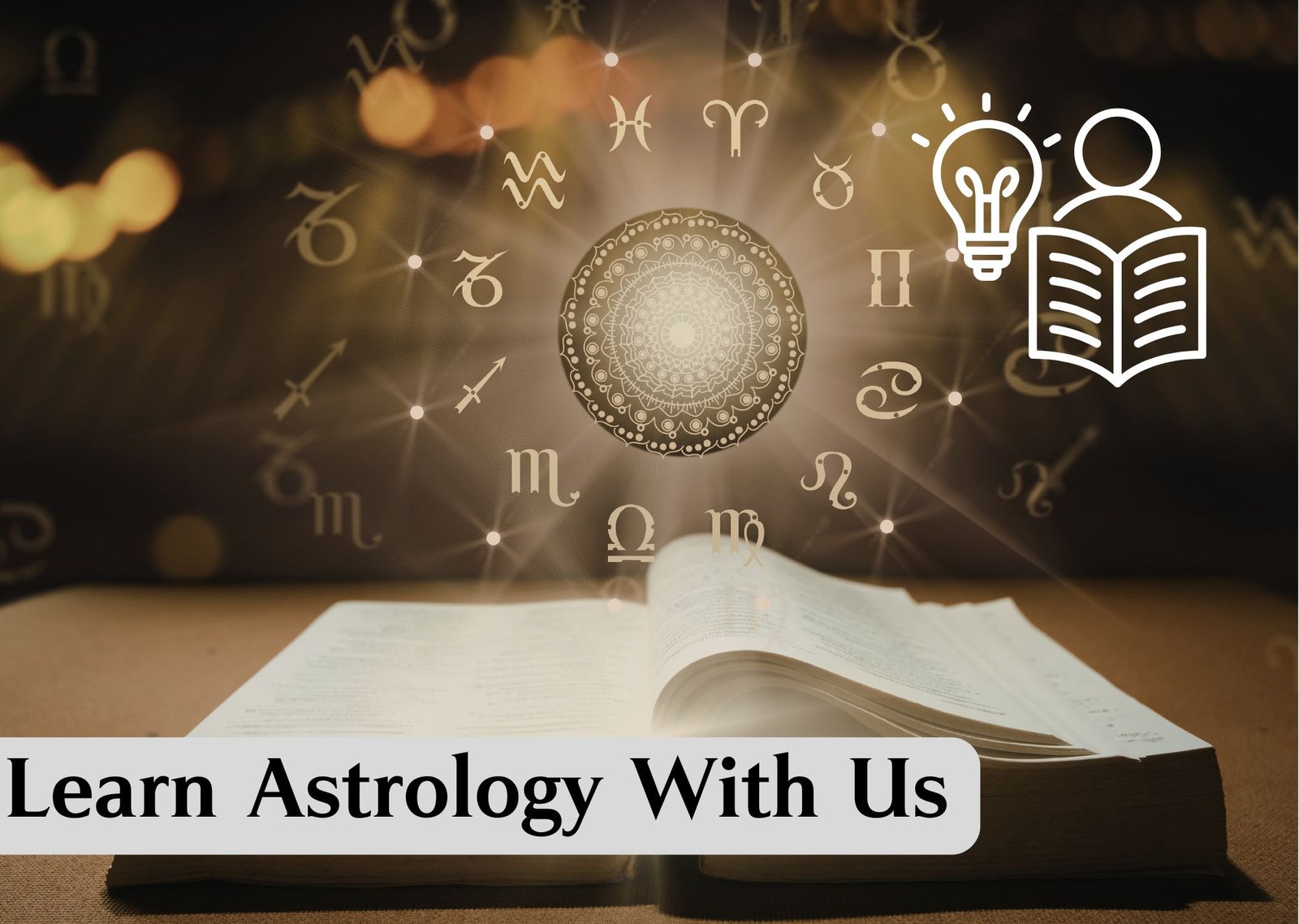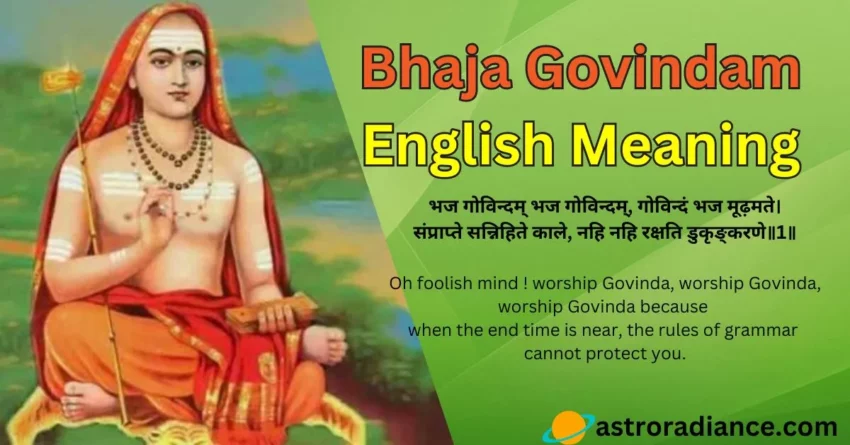Bhaja Govindam was written by Jagadguru Adi Shankaracharya. It is also known as Moha Mudgara. Bhaja Govindam is one of the short compositions of Adi Shankaracharya. Although it is sung in the form of a hymn, it contains the essence of Vedanta and inspires man to think why am I here in this life? Why am I accumulating wealth and family, but no peace? What is the truth? What is the purpose of life? In this way, an awakened person can know God by following the path of inner consciousness.
Bhaja Govindam English Meaning
भज गोविन्दम् भज गोविन्दम्, गोविन्दं भज मूढ़मते।
संप्राप्ते सन्निहिते काले, नहि नहि रक्षति डुकृङ्करणे॥1॥
bhajagovindaM bhajagovindaM govindaM bhajamuuDhamate .
saMpraapte sannihite kaale nahi nahi rakshati DukRiJNkaraNe
Oh foolish mind (afflicted with attachment), worship Govinda, worship Govinda, worship Govinda because when the end time is near, the rules of grammar cannot protect you.
मूढ़ जहीहि धनागमतृष्णाम्, कुरु सद्बुद्धिमं मनसि वितृष्णाम्।
यल्लभसे निजकर्मोपात्तम्, वित्तं तेन विनोदय चित्तं॥2॥
mUDha jahiihi dhanaagamatRishhNaaM kuru sadbuddhiM manasi vitRishhNaam.
yallabhase nijakarmopaattaM vittaM tena vinodaya chittam. .. (2)
O foolish one! Give up the desire to accumulate wealth. Abandon all desires from your mind and concentrate your mind on the search for truth. Keep your mind happy only with the money you get from your hard work.
नारीस्तनभरनाभीदेशम्, दृष्ट्वा मागा मोहावेशम्।
एतन्मान्सवसादिविकारम्, मनसि विचिन्तय वारं वारम्॥3॥
naariistanabhara naabhiideshaM dRishhTvaa maagaamohaavesham.
etanmaaMsaavasaadi vikaaraM manasi vichintaya vaaraM vaaram. .. (3)
Don’t get fascinated and attached to a woman’s body parts like breasts, navel etc. Constantly remember in your mind that these are nothing other than the disorders (transformation i.e. this is the form of flesh) of flesh, fat etc.॥3॥
नलिनीदलगतजलमतितरलम्, तद्वज्जीवितमतिशयचपलम्।
विद्धि व्याध्यभिमानग्रस्तं, लोकं शोकहतं च समस्तम्॥4॥
naliniidalagata jalamatitaralaM tadvajjiivitamatishayachapalam .
viddhi vyaadhyabhimaanagrastaM lokaM shokahataM cha samastam .. (4)
Man’s life is uncertain and short (fleeting) like the drops of water lying on a lotus leaf. Know that this entire world is immersed in disease, ego and sorrow.4॥
यावद्वित्तोपार्जनसक्त:, तावन्निजपरिवारो रक्तः।
पश्चाज्जीवति जर्जरदेहे, वार्तां कोऽपि न पृच्छति गेहे॥5॥
yaavadvittopaarjana saktaH staavannija parivaaro raktaH .
pashchaajjiivati jarjara dehe vaartaaM ko.api na pRichchhati gehe .. (5)
As long as a person is capable of earning money, everyone in the family shows affection towards him, but in old age or when the body becomes worn out, it is not even asked about in a normal conversation.॥5॥
यावत्पवनो निवसति देहे, तावत् पृच्छति कुशलं गेहे।
गतवति वायौ देहापाये, भार्या बिभ्यति तस्मिन्काये॥6॥
People ask about well-being only as long as there is life in the body. As soon as the vital air leaves the body, even the wife becomes afraid of that body.॥6॥
yaavatpavano nivasati dehe taavatpRichchhati kushalaM gehe .
gatavati vaayau dehaapaaye bhaaryaa bibhyati tasminkaaye .. (6)
बालस्तावत् क्रीडासक्तः, तरुणस्तावत् तरुणीसक्तः।
वृद्धस्तावच्चिन्तासक्तः, परे ब्रह्मणि कोऽपि न सक्तः॥7॥
baalastaavatkriiDaasaktaH taruNastaavattaruNiisaktaH .
vRiddhastaavachchintaasaktaH pare brahmaNi ko.api na saktaH .. (7)
In childhood, a person has attachment (interest) in sports, in youth he has attachment (attraction) towards young women, in old age he is surrounded by worries, but no one has attachment (attraction) to the Supreme Brahma.॥7॥
का ते कांता कस्ते पुत्रः, संसारोऽयमतीव विचित्रः।
कस्य त्वं वा कुत अयातः, तत्त्वं चिन्तय तदिह भ्रातः॥8॥
kaate kaantaa kaste putraH saMsaaro.ayamatiiva vichitraH .
kasya tvaM kaH kuta aayaataH tattvaM chintaya tadiha bhraataH .. (8)
Who is your wife, who is your son, this cycle of the world is very strange, who are you, where have you come from, brother! Know this thing first॥8॥
सत्संगत्वे निस्संगत्वं, निस्संगत्वे निर्मोहत्वं।
निर्मोहत्वे निश्चलतत्त्वं निश्चलतत्त्वे जीवन्मुक्तिः॥9॥
satsaNgatve nissN^gatvaM nissaNgatve nirmohatvam.h .
nirmohatve nishchalatattvaM nishcalatattve jiivanmuktiH .. (9)
Through satsang comes renunciation, through renunciation one attains nirmoha (freedom from illusion), through nirmoha one attains stable philosophical knowledge and through philosophical knowledge one attains moksha (liberation from the cycle of birth and death).॥9
व यसि गते कः कामविकारः, शुष्के नीरे कः कासारः।
क्षीणे वित्ते कः परिवारः, ज्ञाते तत्त्वे कः संसारः॥10॥
vayasigate kaH kaamavikaaraH shushhke niire kaH kaasaaraH .
kshiiNevitte kaH parivaaraH GYaate tattve kaH saMsaaraH .. (10)
After the passage of age, lust becomes useless, when the water dries up, the pond is useless, when money goes away, family (relatives) no longer exist and after attaining Tatv Gyan, the world (cycle of birth and death) no longer exists. 10॥





![[Big Size] Vils Sri Jagadguru Adi Shankaracharya Divine Holy Blessing Wood and Plastic Statue/Photo Frame Cutout with Backstand (Size: 5.5 inch X 8 inch)- Multicolor](https://m.media-amazon.com/images/I/41sM-5ZJGZL._SL500_.jpg)
